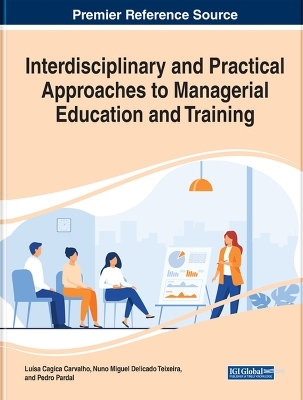
Interdisciplinary and Practical Approaches to Managerial Education and Training
Seiten
2022
Business Science Reference (Verlag)
978-1-7998-8239-8 (ISBN)
Business Science Reference (Verlag)
978-1-7998-8239-8 (ISBN)
Despite the higher development of new teaching approaches in recent years, relevant questions related to learning objectives, suitable methodologies and impact assessment remain unanswered. This book offers insights and discussion on new forms of teaching and training methodologies and curricular programs.
In the last decades, the development of innovative practices have gained considerable interest, but challenges are far from easy. New generations of students grow up in a very different environment, severally influenced by information and communications technologies (ICT). In the 2018 United Nations conference on Trade and Development, the Secretary-General of UNCTAD stated that "we live at a time of technological change that is unprecedented in its pace, scope and depth of impact". Furthermore, in a globalized world, ICT are changing the way businesses create and capture value, how and where we work, and how we interact and communicate.
These allegations were prior to the actual global pandemic, which is an event that accentuated the use of ICT like never before. Thus, some of the traditional teachings methods are rapidly becoming obsolete, unattractive to the new generation of students or needing the complementarity of additional methodologies. In the last years higher education institutions as well as lectures individually, invested in the introduction and development of new teaching methods, including in activities of training.
More active methodologies are being incentivized, like problem based learning (PBL), Co-creation, team based learning (TBL) or gamification. Beside the methodologies, teaching in a more technological environment is essential for promoting digital skills of lectures and students. In the context of COVID-19, practices of e-learning or b-learning increased the adoption of digital platforms, influencing teaching practices. In addition, institutions are also giving attention to the development of soft skills as a complement of hard skills, which opens a field for different teaching contexts and experiences.
Despite the higher development of new teaching approaches in the recent years, relevant questions related to learning objectives, suitable methodologies and impact assessment, remain unanswered. Thus, this book is open to receive research inputs that allow the interested community to learn with experiences as well as to access insights, discussion on new forms of teaching and training methodologies and curricular programs, in all the fields of management.
In the last decades, the development of innovative practices have gained considerable interest, but challenges are far from easy. New generations of students grow up in a very different environment, severally influenced by information and communications technologies (ICT). In the 2018 United Nations conference on Trade and Development, the Secretary-General of UNCTAD stated that "we live at a time of technological change that is unprecedented in its pace, scope and depth of impact". Furthermore, in a globalized world, ICT are changing the way businesses create and capture value, how and where we work, and how we interact and communicate.
These allegations were prior to the actual global pandemic, which is an event that accentuated the use of ICT like never before. Thus, some of the traditional teachings methods are rapidly becoming obsolete, unattractive to the new generation of students or needing the complementarity of additional methodologies. In the last years higher education institutions as well as lectures individually, invested in the introduction and development of new teaching methods, including in activities of training.
More active methodologies are being incentivized, like problem based learning (PBL), Co-creation, team based learning (TBL) or gamification. Beside the methodologies, teaching in a more technological environment is essential for promoting digital skills of lectures and students. In the context of COVID-19, practices of e-learning or b-learning increased the adoption of digital platforms, influencing teaching practices. In addition, institutions are also giving attention to the development of soft skills as a complement of hard skills, which opens a field for different teaching contexts and experiences.
Despite the higher development of new teaching approaches in the recent years, relevant questions related to learning objectives, suitable methodologies and impact assessment, remain unanswered. Thus, this book is open to receive research inputs that allow the interested community to learn with experiences as well as to access insights, discussion on new forms of teaching and training methodologies and curricular programs, in all the fields of management.
Luisa Cagica Carvalho, Institute Polytechnic of Setubal, Portugal Nuno Teixeira, Polithecnic Institute of Setúbal, Portugal Pedro Pardal, Polithecnic Institute of Setúbal, Portugal
| Erscheinungsdatum | 10.03.2022 |
|---|---|
| Sprache | englisch |
| Gewicht | 633 g |
| Themenwelt | Sozialwissenschaften ► Pädagogik ► Berufspädagogik |
| Wirtschaft ► Betriebswirtschaft / Management ► Personalwesen | |
| ISBN-10 | 1-7998-8239-X / 179988239X |
| ISBN-13 | 978-1-7998-8239-8 / 9781799882398 |
| Zustand | Neuware |
| Informationen gemäß Produktsicherheitsverordnung (GPSR) | |
| Haben Sie eine Frage zum Produkt? |
Mehr entdecken
aus dem Bereich
aus dem Bereich
Buch | Softcover (2022)
Schlütersche (Verlag)
CHF 73,90
Buch | Softcover (2020)
Christiani, Paul (Verlag)
CHF 38,75
Fragen und Antworten zur Prüfungsvorbereitung für die Kurse …
Buch | Softcover (2023)
Deutsche Vereinigung für Wasserwirtschaft, Abwasser und … (Verlag)
CHF 67,90


